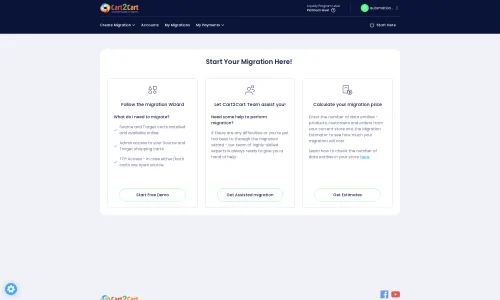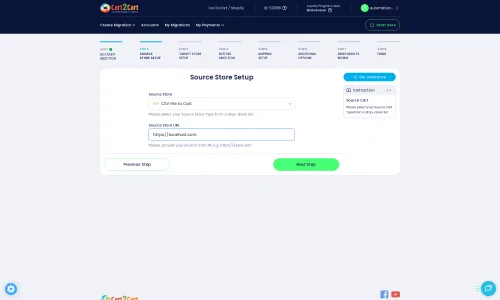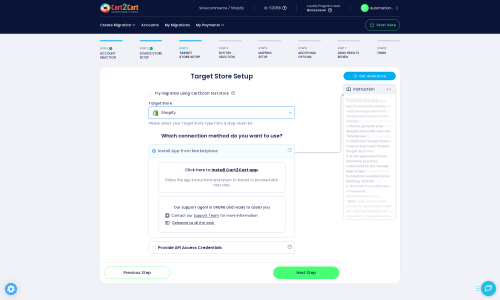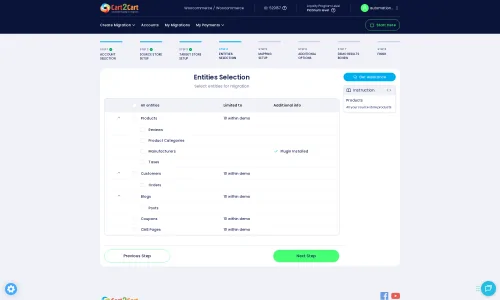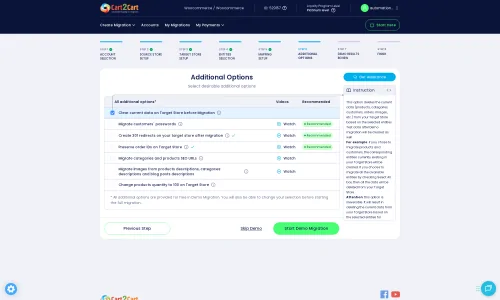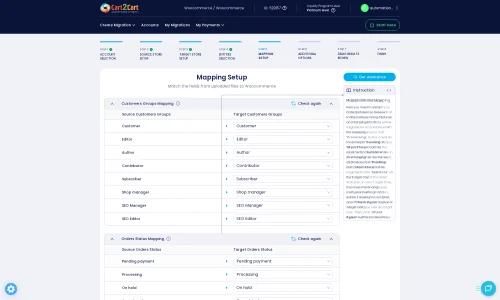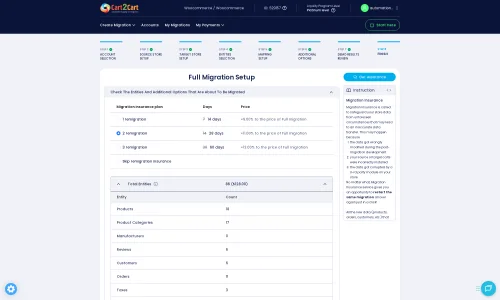Kajabi to Shopify Migration - Step-by-Step Guide & Expert Services
Kajabi to Shopify migration made effortless. Looking to move Kajabi store to Shopify? Cart2Cart guarantees a swift, secure, and complete transfer data process, meticulously preserving your SEO rankings and ensuring zero downtime. Whether you're ready to switch from Kajabi to Shopify with our intuitive step-by-step guide or prefer our expert team to handle everything, we deliver a flawless, worry-free transition. Experience the optimal Kajabi to Shopify migration today.
What data can be
migrated from Kajabi to Shopify
-
Products
-
Product Categories
-
Manufacturers
-
Customers
-
Orders
Estimate your Migration Cost
To check your Kajabi to Shopify migration price, click the button below. The migration price varies in accordance with the number of data types and the additional migration options selected.
How to Migrate from Kajabi to Shopify In 3 Steps?
Connect your Source & Target carts
Choose Kajabi and Shopify from the drop-down lists & provide the stores’ URLs in the corresponding fields.
Select the data to migrate & extra options
Choose the data you want to migrate to Shopify and extra options to customise your Kajabi to Shopify migration.
Launch your Demo/Full migration
Run a free Demo to see how the Cart2Cart service works, and when happy - launch Full migration.
Migrating Your E-commerce Store from Kajabi to Shopify: A Complete Guide
Seamlessly Migrating Your E-commerce Store from Kajabi to Shopify
As your online business evolves, you might find yourself needing a platform that offers greater scalability, extensive e-commerce features, and a broader app ecosystem. While Kajabi excels at selling digital products, courses, and memberships, Shopify is a powerhouse for all types of e-commerce, providing robust tools for product management, sales, marketing, and global expansion. This guide will walk you through the entire process of transitioning your existing e-commerce data from Kajabi to Shopify, ensuring a smooth and efficient replatforming experience.
Since Kajabi does not have a direct API integration for automated migrations, our approach will involve exporting your valuable store data from Kajabi into CSV files. These CSV files will then serve as the source for importing your products, customer data, orders, and other essential information into your new Shopify store. This CSV.File Data Migration method ensures that you retain the integrity of your hard-earned data during the transfer process.
Prerequisites for a Successful Migration
Before initiating the data transfer, careful preparation of both your Kajabi source store and your Shopify target store is crucial to ensure data integrity and minimize downtime.
For Your Kajabi (Source) Store:
- Data Export: Thoroughly export all relevant e-commerce data from your Kajabi account. This includes products (with SKUs and variants), customer records, order history, CMS pages, and blog posts. Kajabi typically allows exporting these entities into CSV files. Ensure you capture as much detail as possible to facilitate a comprehensive data transfer.
- Data Cleanup: Take this opportunity to review and clean your Kajabi data. Remove any outdated products, duplicate customer entries, or irrelevant information. A clean dataset will result in a more streamlined migration to Shopify.
- Full Backup: Always perform a complete backup of your Kajabi store's data before starting any migration process. This safeguards your information against any unforeseen issues.
For Your Shopify (Target) Store:
- Set Up Your Shopify Account: Create a new Shopify store or ensure your existing one is ready to receive data. Select an appropriate Shopify plan; be aware that a "Pause and Build" plan might temporarily block order processing during specific phases of your store setup.
- Install Cart2Cart Store Migration App: To facilitate the import of your CSV data into Shopify, you will need the Cart2Cart Store Migration App. This app streamlines the connection process and helps manage the data transfer.
- Disable Notifications: It is highly recommended to temporarily disable all customer notifications in your Shopify store settings during the migration. This prevents customers from receiving irrelevant or duplicate emails during the data import process.
- Plan for Reviews: If your Kajabi store had product reviews, note that Shopify natively requires specific apps for review management. For instance, "Reviews require AirReviews app" or a similar solution to properly display and manage migrated reviews.
- Familiarize Yourself with Shopify: Understand Shopify's structure, including how it handles products, categories, customer groups, and order statuses. This will be vital for accurate data mapping later.
- For more detailed guidance, read our How to prepare Target store for migration? and How to prepare Source store for migration? articles.
Performing the Migration: A Step-by-Step Guide
With your preparations complete, let's dive into the step-by-step process of moving your e-commerce assets to Shopify using the Cart2Cart migration wizard.
Step 1: Initiate Your Migration
Begin by navigating to the migration service platform. You'll typically find an intuitive interface designed to guide you through the process.
Step 2: Configure Your Source Store (Kajabi via CSV)
In this crucial step, you'll specify Kajabi as your source, effectively treated as a CSV File input.
- Select Source Platform: From the dropdown menu, choose "CSV File to Cart" as your source shopping cart. Since Kajabi doesn't offer a direct API for migration, using CSV files is the most effective method for data transfer.
- Upload CSV Files: Upload the prepared CSV files containing your Kajabi data. Ensure all necessary files for products, customer records, orders, and other entities are included. The system will process these files to extract your store's information.
Step 3: Connect Your Target Store (Shopify)
Next, you'll establish the connection to your new Shopify store, which will receive all your migrated data.
- Select Target Platform: Choose "Shopify" from the list of available target platforms.
- Establish Connection: The recommended method is to "Install App from Marketplace." Click the provided link to install the Cart2Cart Store Migration App directly from the Shopify App Store. This app simplifies the connection process by handling API scopes and authentication automatically. Alternatively, you can opt to "Provide API Access Credentials," which involves manually generating an Admin API access token in your Shopify admin. For help with this, refer to The Short & Essential Guide to Access Credentials for Cart2Cart.
Step 4: Select Data Entities for Migration
This stage allows you to precisely define what data you want to transfer from Kajabi to Shopify.
You can choose to migrate all entities or select specific ones. Based on the supported entities for CSV and Shopify, you can transfer:
- Products: Including product details, SKUs, and variants.
- Product Categories: To maintain your store's structure.
- Products Reviews: Though these might require a third-party app on Shopify for proper display.
- Customers: Transferring customer accounts and their associated information.
- Orders: Migrating your complete order history.
- CMS Pages: Essential static pages from your Kajabi site.
- Blogs & Blog Posts: To maintain your content strategy and SEO value.
- Coupons & Price Rules: To ensure your promotional strategies are carried over.
Step 5: Configure Additional Options & Data Mapping
This step fine-tune your migration settings and ensures data consistency.
Additional Migration Options:
Consider these valuable options to enhance your data transfer:
- Clear Target Store Data: The "Clear Target store before migration" option is useful if you're migrating into a new or empty Shopify store, removing any existing sample data.
- Preserve Order IDs: This option helps maintain consistency in your order numbering, which is beneficial for accounting and record-keeping. Learn more about "How Preserve IDs options can be used?"
- SEO URLs & 301 Redirects: Essential for maintaining your search engine rankings and link equity. "Create 301 SEO URLs" will automatically set up redirects from your old Kajabi URLs to the new Shopify ones, preventing broken links and preserving your SEO.
- Migrate Images in Description: Ensures that product and category images embedded within descriptions are transferred correctly.
Data Mapping:
Data mapping is critical for ensuring that fields from your Kajabi CSV files correctly correspond to the fields in Shopify. You will map customer groups, order statuses, and potentially product attributes to their Shopify equivalents, ensuring accurate data integrity post-migration.
Step 6: Run Free Demo & Full Migration
Once all settings are configured, you can initiate the transfer process.
- Run Free Demo: It's highly recommended to run a free demo migration first. This transfers a limited number of entities (e.g., 10-20 products, customers, orders) to your Shopify store, allowing you to preview the results and ensure everything is mapping correctly before committing to the full transfer.
- Start Full Migration: After reviewing the demo results and making any necessary adjustments, proceed with the full migration. This will transfer all selected data from your Kajabi CSVs to your Shopify store. Consider opting for a Migration Insurance Plan, which provides a certain number of remigrations for a specified period, offering peace of mind.
Post-Migration Steps
After your data has successfully been transferred, several crucial post-migration tasks remain to ensure your new Shopify store is fully operational and optimized.
- Thorough Data Verification: Rigorously check all migrated data. Verify products (SKUs, variants, descriptions, images), customer accounts, order history, CMS pages, and blog posts. Ensure all information is accurate and displayed correctly on your new Shopify storefront.
- Test SEO & Redirects: Confirm that your 301 redirects are working as expected by testing old Kajabi URLs. This is vital for preserving your SEO rankings and link equity. Update any internal links within your store to point to the new Shopify URLs.
- Install Essential Apps: Add any necessary Shopify apps that replicate functionality from Kajabi or enhance your store's capabilities. This includes review apps (like AirReviews), marketing tools, analytics, and shipping solutions.
- Configure Store Settings: Set up your payment gateways, shipping zones, tax settings, and any other specific configurations required for your e-commerce operations.
- Theme Customization: Customize your Shopify theme to match your brand's aesthetic and ensure a consistent user experience.
- Conduct Extensive Testing: Perform thorough functional testing. Place test orders, check customer registration, verify contact forms, and ensure all interactive elements work flawlessly. Test on various devices and browsers.
- Update DNS Records: Once you are completely satisfied with your new Shopify store, update your domain's DNS records to point to Shopify. This will officially switch your live store to the new platform. Consider using the Recent Data Migration Service if new data was created on your Kajabi store during the final stages of your migration.
- Monitor Performance: After going live, continuously monitor your store's performance, user experience, and SEO rankings. Address any issues promptly. Keep in mind, "Does migration influence the speed of my store?" and "Can my new hosting cause migration interruption?" are common considerations.
By following these detailed steps, your transition from Kajabi to Shopify will be a streamlined process, enabling you to leverage Shopify's robust e-commerce capabilities for continued growth and success.
Ways to perform migration from Kajabi to Shopify
Automated migration
Just set up the migration and choose the entities to move – the service will do the rest.
Try It Free
Data Migration Service Package
Delegate the job to the highly-skilled migration experts and get the job done.
Choose Package

Benefits for Store Owners

Benefits for Ecommerce Agencies
Choose all the extra migration options and get 40% off their total Price

The design and store functionality transfer is impossible due to Kajabi to Shopify limitations. However, you can recreate it with the help of a 3rd-party developer.
Your data is safely locked with Cart2Cart
We built in many security measures so you can safely migrate from Kajabi to Shopify. Check out our Security Policy
Server Security
All migrations are performed on a secure dedicated Hetzner server with restricted physical access.Application Security
HTTPS protocol and 128-bit SSL encryption are used to protect the data being exchanged.Network Security
The most up-to-date network architecture schema, firewall and access restrictions protect our system from electronic attacks.Data Access Control
Employee access to customer migration data is restricted, logged and audited.Frequently Asked Questions
How do I transfer my Kajabi store's design or theme to Shopify?
Is my store data secure during the Kajabi to Shopify migration?
Can customer passwords be migrated from Kajabi to Shopify?
How long does a Kajabi to Shopify migration typically take?
How can I prevent SEO loss when migrating from Kajabi to Shopify?
What data can be migrated from Kajabi to Shopify?
What factors influence the cost of migrating from Kajabi to Shopify?
How can I ensure data accuracy after migrating from Kajabi to Shopify?
Should I use an automated tool or hire an expert for Kajabi to Shopify migration?
Will my Kajabi store experience downtime during migration to Shopify?
Why 150.000+ customers all over the globe have chosen Cart2Cart?
100% non-techie friendly
Cart2Cart is recommended by Shopify, WooCommerce, Wix, OpenCart, PrestaShop and other top ecommerce platforms.
Keep selling while migrating
The process of data transfer has no effect on the migrated store. At all.
24/7 live support
Get every bit of help right when you need it. Our live chat experts will eagerly guide you through the entire migration process.
Lightning fast migration
Just a few hours - and all your store data is moved to its new home.
Open to the customers’ needs
We’re ready to help import data from database dump, csv. file, a rare shopping cart etc.
Recommended by industry leaders
Cart2Cart is recommended by Shopify, WooCommerce, Wix, OpenCart, PrestaShop and other top ecommerce platforms.



